8+ Sample Work Contract Agreements
-
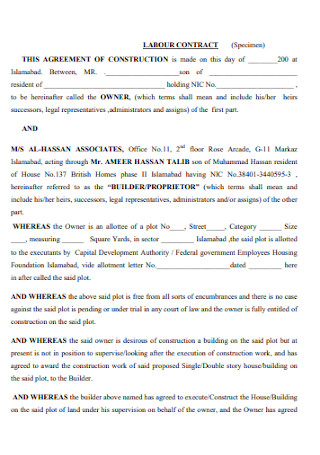
Labor Work Contract Agreement
download now -
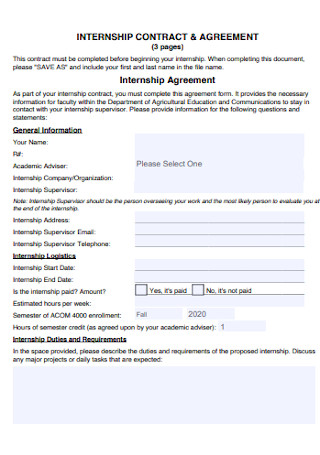
Internship Work Contract Agreement
download now -
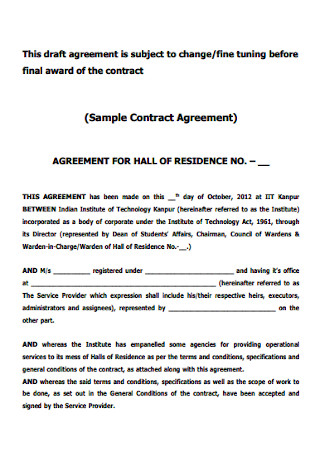
Sample Work Contract Agreement
download now -
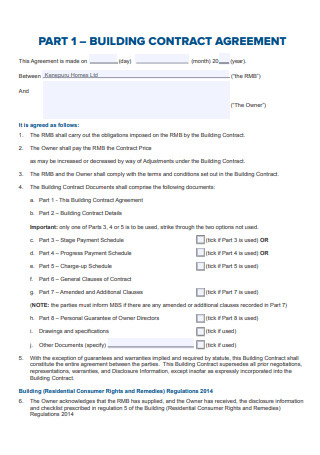
Building Work Contract Agreement
download now -
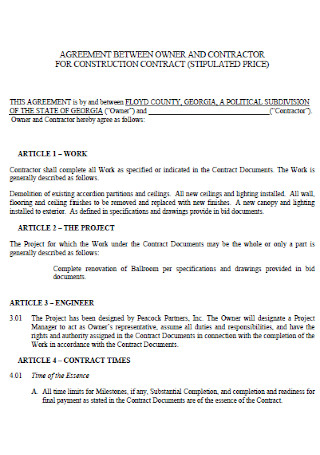
Construction Work Contract Agreement
download now -
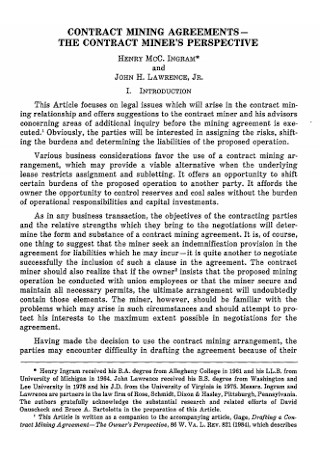
Mining Work Contract Agreement
download now -
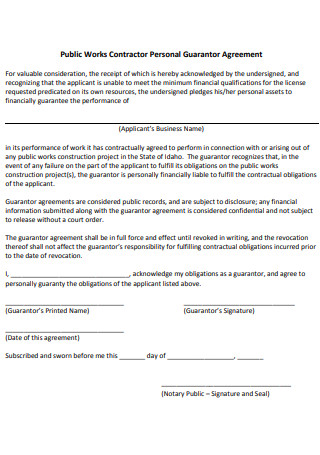
Public Work Contract Agreement
download now -
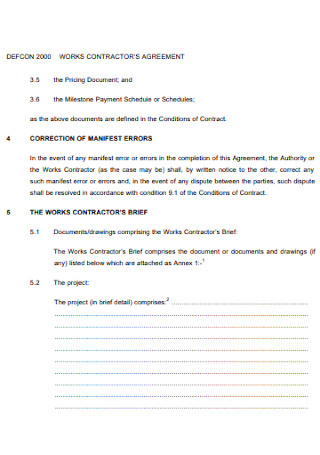
Work Contractor Agreement Template
download now -
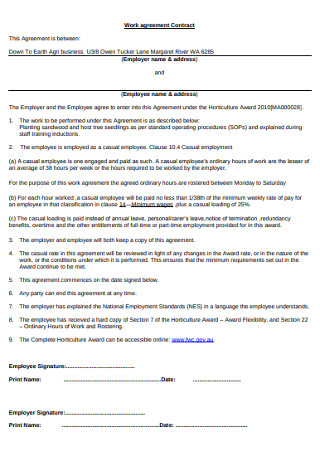
Simple Work Contract Agreement
download now
In this article, we discuss what a work contract agreement is and what it contains to compel employees to understand what they are reading and be armed with the knowledge of what can guarantee them better working conditions. Read more below and get a hold of 8+ of our work contract samples!
What is a Work Contract Agreement?
A Work Contract comes with many names. It can be called an Employment Contract, a Job Contract, or a Labor Contract and it will all function in similar ways. It is a legally binding document between an employer and an employee that essentially protects the rights of both parties to a fair and just employment setup due to how it shall stipulate the obligations that they shall both fulfill throughout the length of the contract.
Before expounding further, we think it would be wise to first differentiate what an agreement is from a contract. Although both terms can be understandably used interchangeably, there is a minimal distinction between the two that warrants caution on its usage especially when the context legally requires appropriate terms to be used so as not to cause misunderstandings.
An agreement can be likened to a proposal in the sense that it offers both parties a framework or a rule book through which their actions can be guided by. Nothing in an agreement is final until both parties are satisfied with the terms and conditions written in it however, once both parties arrive to a mutual and final understanding, the agreement can become the contract especially when the individuals involved have affixed their signatures therefore making the agreement formal, legal and binding meaning, both parties shall fulfill what has been agreed upon because otherwise, in compliance to what is stated in the contract, consequences, penalties, fees, compensations shall be bestowed. It is thus important that contracts are best displayed in writing as it shall serve as physical documentation proving that such an arrangement exists should things go haywire and allegations of breach of contract are charged against the other. It will be easier then to keep track of which section and provision in the contract are violated and its corresponding action.
Now that the two concepts are defined, we move on to further explain what exactly a work contract is and as you read more, what it shall contain.
Besides the redundantly mentioned use of a work contract agreement that is to protect the employers and employees from contractual misunderstandings, work contract agreements are necessary for businesses to ensure that it performs as it expects to to actualize their strategic measures indicated in maybe their business plans to keep the business running. This is because a work contract agreement details the responsibilities, including responsibilities that are beyond their job descriptions, that an employee has to satisfactorily fulfill in order to render the kind of service that meets the standards set by the management. A work contract also guarantees that the employee is secured their employment rights, primarily the rights to be paid and offered a good working environment that acknowledges one’s inherent human rights.
A work contract agreement is usually presented by the employer to an employee once they approve the job offer and shall be returned with the signature before the first day of the job or within the first week, or even the first month of employment. However, it is encouraged that the contract is signed as soon as possible to concretize the relationship.
Types of a Work Contract
The work contract that an employee is offered with is based on the kind of their employment status so contracts are likely to come in various forms. Below are the most common types of employment contracts that employers should appropriately determine before they are to present it to the employees and for the employees to be aware of the kind of contract they should be assigned to sign that is apt to their employment status.
1. Permanent Employment Contract
Permanent contracts are the most common type of contracts prepared by employers for their skilled employees who they can vouch can be an asset to the company. Employees under this contract can either work full-time or part-time which the contract shall be able to establish beforehand. The major difference in the kind of contracts that the mentioned employees receive is the number of hours both the employees shall serve. A full time employee is usually given a full work week schedule lasting 35 hours or more and the latter, a reduced number in comparison. The contract shall also detail the benefits, paid holidays, sick pay and retirement plans and while both types of employees can receive this, some benefits are especially reserved for full-time employees. An important element in a permanent contract is the information on the working hours of the employees so employers should think it best to be able to outline the corresponding section with clarity so as not to cause confusion on the employees’ end.
2. Fixed-term Employment Contract
A fixed-term contract is usually offered to seasonal employees or employees required to complete a project. The employees under this contract are already meant to work under limited time and once they complete their service, the employment relationship shall automatically cease unless an appeal is made asking for an extension. Because this is the nature of the employment type, it is thus important that the duration to be completed as well as when the contract will end shall be made aware and understood by both sides. The period of employment could last for months, even years and may even be extended; however, there are states, under their Labor Code, that limit the period of time for most contracts of this nature to end and in some cases, would have to require an employer to reward the employee with permanent status as opposed to extending their contract.
Under the fixed-term contract, employees are entitled to enjoy the same rights that permanent employees get to enjoy; however, there can be just provisions made that may limit these rights. Regardless if this is allowed, non-negotiables include pay, benefits, terms and working conditions and what entails an employee’s statutory rights (ie., paid holidays, maternity leave, paid at least the national minimum wage, etc.)
As mentioned, fixed-term contracts end once the employee renders their service and it can end without the need to issue a notice. However, the contract can still allow for early termination which shall be clear in its writing and this can mostly include having to file a notice to enforce the early termination. Likewise, the contract shall also indicate a clause that allows the employer to offer for a contract extension.
3. Zero-Hour Employment Contract
A zero-hour contract is a tricky type of contract in the sense that both the employer and the employee agree to a non-committing employment relationship so this kind of contract is understandably rarely offered. In a zero-hour contract, the employer is not necessarily obliged to include information about the amount of hours that an employee has to complete which should work for an employee under this contract as they’re usually those who work irregularly from the different kind of jobs that they also have, which they are legally allowed to take as the nature of the employment relationship under a zero-hour contract does not hitch the employee to the company and allows them to seek for other employers. However, the contract can include a provision that an employee should agree to which is to remain on call for availability purposes and consent to working shifts required by the employer. The contract does reserve the employee the right to refuse work offered by an employer for reasons that are just.
Lastly, employees under this contract do get to enjoy their statutory rights however, it might be less than what a typical permanent employee is entitled to. Information about the standard rate of pay is also usually excluded in the contract as well as the maximum benefits they can receive. With all that being said, it should make sense why a zero-hour contract is rare and risky.
4. Probation Employment Contract
Under a Probation Employment Contract, an employee is subjected to complete a specified period of time, also referred to as the ‘probationary period’, before they are made a regular employee. This is usually offered by employers to ensure that the employee can put into action the loaded credentials they have submitted in their resume. It is essentially a layer of protection enforced by an employer to rid them of the risks from having to commit to paying an employee who unfortunately cannot meet the imposed qualifications the company needs from their staff and especially for probationary employees so their employment status can transition into permanence with access to higher pay and the maximum benefits. During the probationary period, an employee’s individual development or the lack thereof is being evaluated to see if they are appropriate for their job positions and if they have the skills, endurance, and the work ethics to keep up with the demands of the company and its regular operations.
In a probation employment contract, it is important that the length of the probationary period is specified and the just grounds that shall serve as basis for the employer to terminate the employment relationship especially since they reserve the right to do so for something as simple as their inability to perform as desired even without prior notice. It is also important for the contract to stipulate the probability of an extension if the employer were to continue to assess the employee more; however, the extension cannot exceed what is mandated by the state’s labor code. The probation contract also includes information about the benefits that probationary employees receive although it should be expected that they receive less than what is granted to regular and permanent employees.
Elements of a Work Contract Agreement
FAQs
What are the Types of Employment Contracts?
Employment contracts may vary depending on what is appropriate for the kind of employment relationship an employer offers an employee. The common types of employment contracts include:
- Permanent Employment Contract
- Fixed-Term Employment Contract
- Zero-Hour Employment Contract
- Probation Employment Contract
What are 6 Elements of a Contract?
The six essential elements that must be contained in a contract are the following:
- Offer
- Acceptance
- Mutual Assent or ‘Meeting of the Minds’
- Consideration
- Capacity
- Legality
What is a Work Contract?
A work contract is a legal document that binds an employee and employer into a relationship that subjects them to fulfill what is written in the document. It mostly functions to protect the parties involved from potential misunderstandings but it also, at the same time, is what avoids misunderstandings from occurring. It contains what the employer and the employee needs to do, their responsibilities to each other and to the company, the duration of employment, the salary and benefits as well as how a contract can be terminated.
